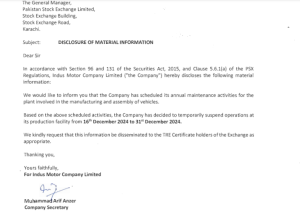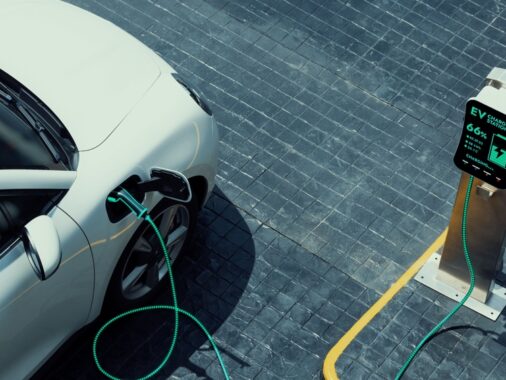Indus Motor Company Limited (PSX: INDU), the assembler and distributor of Toyota cars in Pakistan, announced a temporary halt in production. Operations will be suspended at the company’s manufacturing plant from December 16 to December 31, 2024, for scheduled annual maintenance.
In an official statement to the Pakistan Stock Exchange (PSX) on Friday, the company stated, “We would like to inform you that the company has scheduled its annual maintenance activities for the plant involved in the manufacturing and assembly of vehicles.”

The company clarified that this two-week suspension is a routine measure aimed at ensuring the smooth functioning of its production facility and maintaining high standards of quality and efficiency. While the temporary shutdown may impact short-term output, it is a strategic step toward sustaining long-term operational reliability.
This scheduled downtime underscores Indus Motor’s proactive approach to operational excellence, benefiting both the company and its stakeholders in the long run.
Earlier, the company announced a series of two productions cuts in previous months. The reason behind this temporary suspension was shortage of raw materials and components compounded by ongoing supply chain disruptions.
In September and October, the Toyota assembly plant remained closed from September 26 to 30 and October 29 to 31, respectively. Moreover, the local car maker announced that it would suspend operations from November 27 to 29, 2024.
Toyota says that the majority of its production is locally assembled, and about 70% of its car parts are locally made from raw materials. Locally manufactured using raw materials, any disruption in the supply chain has a direct and immediate impact.
This reliance makes Toyota one of the first companies to feel the effects of supply chain challenges. These repeated suspensions highlight the broader difficulties automakers face in raw material shortages and maintaining stable operations in an increasingly volatile global market.
What do you think about the back-to-back suspensions the company observed in the face of insufficient inventory. Tell us in the comments section.





